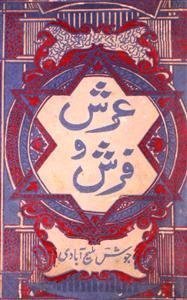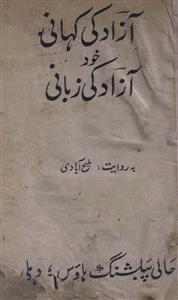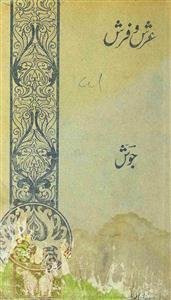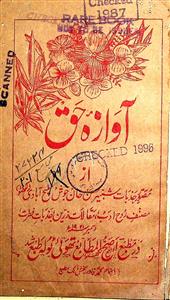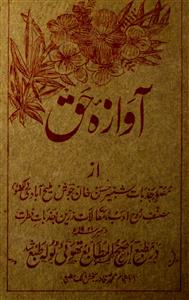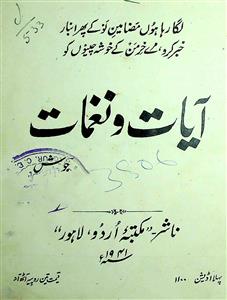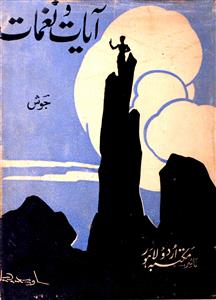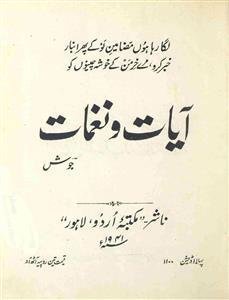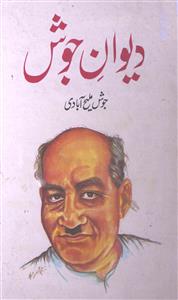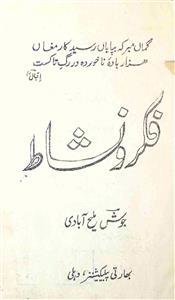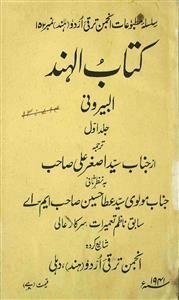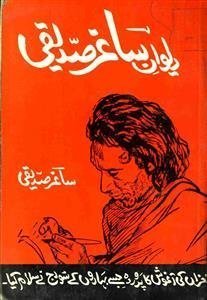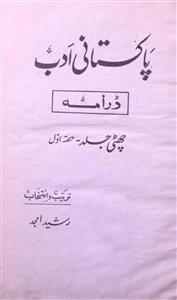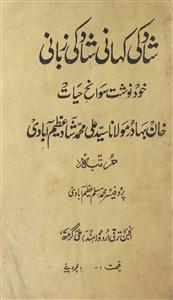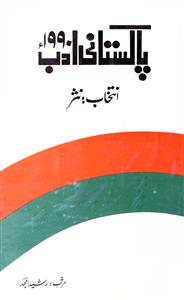 For any query/comment related to this ebook, please contact us at haidar.ali@rekhta.org
For any query/comment related to this ebook, please contact us at haidar.ali@rekhta.org
About The Book
"عرش و فرش"جوش کا شعری مجموعہ ہے جس میں نظموں کےعلاوہ "رباعیات"اوربعنوان"آوارہ خیالات" غزلیں بھی شامل ہیں۔ جوش كی ہرنظم شاعر کےدلی جذبات کی آئینہ دار ہے۔اس کلام کی اہم خوبی بے پناہ روانی وسلاست ہے،الفاظ کا ایسا دریا ہے جو شور مچاتاہر نظم میں محسوس ہورہاہے۔ نئی تشبیہات اور استعاروں کے استعمال نے ان نظموں اور غزلوں کو دلچسپ اور موثر بنادیا ہے۔ شاعر كےاسلوب کی روانی قاری اورسامع کی توجہ اپنی جانب مبذول کروانےمیں کامیاب ہے۔اس مجموعہ كے مطالعہ سے یہ اندازہ ہوتا ہے كہ جوش پایہ كے شاعر ہونے كے ساتھ ساتھ اپنے دل میں آزادی كی امید جگائے ركھتے تھے۔ان کے کلام میں جدوجہد آزادی اور امید آزادی کے موضوعات بھی ملتے ہیں۔جوش کی زبان مشکل اور آسان الفاظ کا امتزاج ہے۔ان كی بعض نظموں میں مشكل الفاظ كا استعمال بھی ہوا ہے،جو عام فہم نہیں ہیں۔اس کی وجہ یہی ہے کہ انھوں نے آسان گوئی كے بجائے فنی اور علمی انداز پر زیادہ زور دیا ہے۔ان كے كلام میں انقلابی لب ولہجہ كے ساتھ رومانیت كا عنصر بھی نمایاں ہے۔
About The Author
Sahbbir Hasan Khan (1898-1982), better known as Josh Malihabadi, was born in a family of feudal masters at Malihabad near Lucknow. After receiving his initial instructions in conventional subjects at home, he continued his education in snatches at several places like Sitapur, Lucknow, Agra, and Aligarh. Following his father’s death and the attendant issues emerging thereafter, he had to discontinue his education. In 1924, he left for Hyderabad to join Dar-ul-Tajuma, Osmania University’s bureau of translation. Following a controversy, he had to leave this institution and return to his native place. In 1936, he started publishing a journal called Kaleem from Delhi which ran for three years. In 1941, he joined Shalimar Pictures at Poona and wrote lyrics for films. In 1948, he was appointed editor of Aajkal, a literary journal published by the Ministry of Information and Broadcasting, Government of India and worked there for eight years. In 1956, he migrated to Pakistan where he was appointed as literary advisor of Urdu Board. He travelled to India in 1967 and gave an interview in Bombay which led to his losing job in Pakistan. Josh breathed his last in Islamabad where he was buried.
Carrying forward the legacy that he inherited from his great grandfather, grandfather and father, Josh started writing poetry at an early age. He was labelled as a poet of revolution because of his thematic concerns and his grandiloquence. He is notable among the Urdu poets for his acute socio-political concerns on the one hand and romantic preoccupations on the other. For expressing himself with conviction, he developed an exclusive kind of charged diction and a new set of implicated metaphors. These qualities imparted an element of uniqueness to his poetry. Josh published several collections of his poetry which include Rooh-e-Adab, Shaayer ki Raatein, Naqsh-o-Nigar, Shola-O-Shabnam, Fikr-O-Nishat, Junoon-O-Hikmat, Harf-O-Hikaayat, Aayaat-O-Naghmaat, Arsh-O-Farsh, Raamish-O-Rung, Sumbul-O-Salaasil, Saif-O-Suboo, Surood-O-Kaharosh, Sumoom-O-Sabaa, Tulu-i-Fikr, Qatra-O-Qulzum, and Nawaaredaat-e-Josh. He also wrote in prose. His prose works include Nujoom-O-Jawahar, Mauja-i-Fikr, Auraaq-e-Sahar, Ilhaam-O-Maqaalaat-e-Zarreen, and Ishaaraat. Josh’s autobiography, Yaadon ki Baraat, created lots of interest among his readers, and it keeps them curious even now.
 For any query/comment related to this ebook, please contact us at haidar.ali@rekhta.org
For any query/comment related to this ebook, please contact us at haidar.ali@rekhta.org
Write a Review
Jashn-e-Rekhta 10th Edition | 5-6-7 December Get Tickets Here
